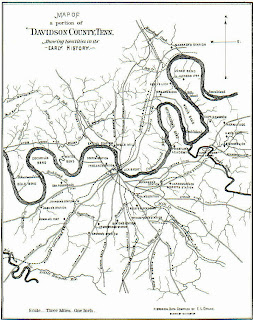In the course of researching several Reeves’ families who migrated into Tennessee in the early part of the 19th century, I was surprised to find such a large influx of diverse families who were recorded there by the 1830 census.
The only Reeves’ individuals listed in the census of the Cumberland Settlements 1770 to 1790 (taken from various source documents found in the records of Sumner and Davidson counties) are Charlotte Reeves Robertson and a William Reeves who is presumably Charlotte’s brother. This William Reeves is listed as arriving with the Donelson flotilla and may have accompanied Charlotte as she and other wives made the perilous trip west in flatboats on the Cumberland River. If this was William Reeves the brother of Charlotte, he did not remain long for within a short time, he is again recorded in the Watauga settlement of North Carolina. It was approximately 20 years before Charlotte's brother William made a permanent move to Tennessee. Charlotte's nephew Jordan Reeves, Jr. is also recorded in Davidson County prior to 1800 and in tax lists of Wilson County between 1800 and 1810.

A Moses Reeves, listed as having been born in Virginia in 1768, married Sarah Gibson in Greene County on 5 Nov 1796 and is recorded on the tax lists in Blount County in 1800 and Greene County in 1805. Moses and his family remained in Greene County where he is listed as deceased on the 1850 Federal Census and Mortality Schedule. A William Reeves is also included on the 1805 Greene County tax lists. Two individuals descending from Moses and from William Reeves have participated in the Reeves DNA Project but their DNA does not match any of the other 14 groups currently identified. By the 1810 census, John Reeves and Hooker Reeves, both aged 26-44, are recorded in Wilson County. They were both also named as early settlers to Wilson County in Goodspeed’s history of that area.
The 1820 census records the surge of Reeves’ families who had migrated into middle Tennessee.
James, Jonathan, Reuben and William Reeves are listed in Hickman County. The DNA of descendants of several of these individuals confirm that they also descend from the Rives family of Surry County, Virginia from which Charlotte Reeves Robertson descends and have been placed in DNA Group 8.
In Perry County, just west of Hickman, George and John Reeves are found in the 1820 census living next door to each other. There also appears to be another John Reeves of the same approximate age living in Perry County in 1820.
Jeremiah Turner Reeves is recorded in the 1820 census of Wilson County. He was the son of George Reeves who had migrated to Tennessee from Patrick County, Virginia. George Reeves died in Wilson County in 1816 leaving a will naming Jeremiah and his sister Susannah. Other children of George Reeves have been identified from the marriage records of Patrick County.
In Franklin County, Avery Reeves a descendant of William Reeves of Granville, North Carolina, is found as early as the 1812 tax lists along with an Abner Reeves. Avery's lineage has been established by DNA of a descendant who is a participant in the Reeves DNA Project and placed in Group 3. Maulden Reeves, son of Burgess Reeves of Pendleton County, South Carolina, is found there in deed records by 1818 and recorded in the 1820 census in addition to an unidentified Edward Reeves. Maulden also descends from William Reeves of Granville NC.
William Reeves who was living in Smith County by 1820 gave a deposition for the revolutionary war pension application of his brother, Daniel Reeves of Davidson County. William’s son John is also listed in the 1820 census of Smith County. According to Daniel’s revolutionary war pension statement their father was a John Reeves of South Carolina, probably living in Lancaster County. This family appears to be descended from the Reeves family of Prince William County, Virginia although more participants are needed in the Reeves DNA Project to definitely confirm the lineage.
The flood gates had opened by 1830 and within the next few years the Reeves living in Tennessee are too numerous to mention here. In addition to the families already mentioned, they included descendants of Isaac Reeves, Sr. of Wilkes County, North Carolina living in Wayne County, Willis Reeves and his children of Orange County, North Carolina were in Fayette County, and descendants of Edward Reeves of Bladen County, North Carolina are recorded in Washington County along with countless other Reeves' families throughout Tennessee.






